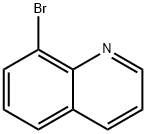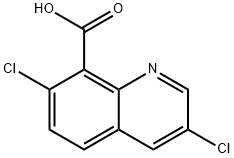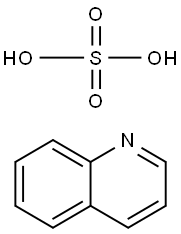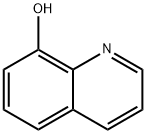A1244812
8-Bromoquinoline , 97% , 16567-18-3
CAS NO.:16567-18-3
Empirical Formula: C9H6BrN
Molecular Weight: 208.05
MDL number: MFCD00191859
EINECS: 630-629-1
| Pack Size | Price | Stock | Quantity |
| 1G | RMB23.20 | In Stock |
|
| 5G | RMB66.40 | In Stock |
|
| 25G | RMB220.80 | In Stock |
|
| 100G | RMB771.20 | In Stock |
|
| others | Enquire |
Update time: 2022-07-08
PRODUCT Properties
| Melting point: | 58-59 °C |
| Boiling point: | 112-113 °C/0.5 mmHg (lit.) |
| Density | 1.594 g/mL at 25 °C (lit.) |
| refractive index | n |
| Flash point: | >230 °F |
| storage temp. | Inert atmosphere,2-8°C |
| pka | 2.33±0.17(Predicted) |
| form | Liquid After Melting |
| color | Clear yellow to yellow-brown |
| Specific Gravity | 1.594 |
| Sensitive | Light Sensitive |
| InChIKey | PIWNKSHCLTZKSZ-UHFFFAOYSA-N |
| CAS DataBase Reference | 16567-18-3(CAS DataBase Reference) |
| NIST Chemistry Reference | Quinoline, 8-bromo-(16567-18-3) |
Description and Uses
8-Bromoquinoline may be used in the following studies:
- Synthesis of 8-(dimesitylboryl)quinolone (ambiphilic molecule).
- Direct synthesis of 5H-pyrido[3,2,1-ij]quinolin-3-one, via palladium catalyzed coupling reaction with acrolein.
- Preparation of 8-(1-hydroxyethyl)quinolone.
- Preparation of 8-quinolylcyclopentadienyl metal complexes, via reaction with zincated cyclopentadienyl derivatives of Fe, Mn and Re in the presence of bis(triphenylphosphine)palladium(0).
- Synthesis of n,n′-biquinolines by a coupling reaction using tris(triphenylphosphine)nickel(0) and a zerovalent pyridine-nickel complex.
Safety
| Symbol(GHS) |  GHS07 |
| Signal word | Warning |
| Hazard statements | H315-H319-H335 |
| Precautionary statements | P261-P264-P271-P280-P302+P352-P305+P351+P338 |
| Hazard Codes | Xi |
| Risk Statements | 36/37/38 |
| Safety Statements | 26-36-37/39 |
| WGK Germany | 3 |
| Hazard Note | Irritant |
| HS Code | 29334900 |




